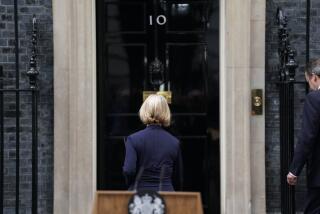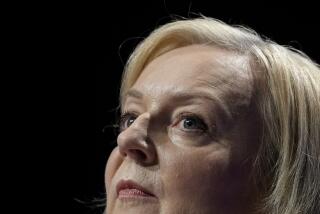Thatcher, Looking West, Is Losing Face at Home : Britain: Two top advisers walk out on the prime minister. Her suspicions of Europeans as wooly, devious--or both--is not the prevailing English view.
- Share via
LONDON — Like political reporters everywhere, those who live in the press gallery of Britain’s House of Commons are a cynical lot--and cynical, above all, about the Commons itself. It may proudly call itself the mother of parliaments, but usually the place is as ill-informed and predictable as you would expect when 650 politicians are gathered together. Only occasionally does the House live up to its billing--and it did so the afternoon of Halloween.
At 5:26, Nigel Lawson who, until five days before, had been Prime Minister Margaret Thatcher’s chancellor of the Exchequer (or chief finance minister), rose to tell his colleagues why he had resigned. Lawson is a proud, some would say, arrogant man--and not usually a good orator. But his 10-minute speech (heard, unusually for the Commons, in total silence) was delivered with none of the pompous attitudes he often adopts, and it was electrifying. For he did nothing less than explain why Thatcher’s government may be falling apart at the seams.
Lawson had been chancellor since Thatcher’s second election victory in 1983 but he was much more than that. Almost alone among the entourage, he had the ability to make the intellectual case for Thatcherism with a politician’s instinct for what would play in the British equivalent of Peoria. He had cut taxes, privatized industries and deregulated the economy. From 1986 to 1988, when Britain grew faster than any other Western economy, he presided over the closest thing to a boom the country had seen for 30 years. If anyone deserved Thatcher’s unstinting support, he did. But he did not get it. To understand why, you have to understand both Margaret Thatcher and Britain’s current economic difficulties.
Ten years of power have not diminished one of Thatcher’s central traits. She thinks of herself as an outsider, enjoying the advice and company of other outsiders. In large measure, her perception of her own position is cracked. No woman before Thatcher had quite managed to snake her way into the charmed world of Britain’s Conservative Party; and on her way to the top, she was patronized and dismissed by many of the smooth men who run it--and who run Britain’s Civil Service. She is not smooth. She is a provincial, suspicious of metropolitan charms. Her whole political life has been dedicated to bucking the conventional wisdom, and she revels in it. She is one of those infuriating people who, when they find themselves in a minority of one, are convinced they are right.
Most of the British economic Establishment--and Nigel Lawson--think exchange-rate stability is a desirable goal in itself, and an invaluable weapon in the battle against inflation. They believe, moreover, that the best way for Britain to secure such stability would be for the pound to become a member of the European exchange-rate mechanism (or ERM) which, within narrow limits, sets rates for the currencies of members within the European community.
Since most Establishment economists think the ERM is beneficial, it is not surprising that Thatcher does not--even though she is nationally committed to joining it “when the time is right.” She has long believed that attempts to manage the currency markets are futile; yet that was Lawson’s policy. When currency dealers were selling the pound (which makes Britain’s imports more expensive, and hence raises domestic inflation) he would raise interest rates to maintain the value of the currency. British rates are now at 15%. This, be it noted, is in a country where almost all home loans are floating rate, which means that interest-rate hikes hurt--and since most home owners vote Conservative, it is Thatcher’s people who feel the pinch.
Hence the prime minister had some political grounds for feeling annoyed with Lawson, and she was much supported by the views of one of her unsmooth, provincial chums--Sir Alan Walters, a British economist who has long spent most of his time in America (at the World Bank or Johns Hopkins University). Walters has offered Thatcher economic advice for most of the 1980s, and this year was scheduled to spend half his time in her employ. His views on exchange-rate management are robust; he thinks it stinks. The ERM, he said in an article published only last week, is “half-baked.” In Lawson’s view, “No case can be made for seeming confusion or vacillation between the two positions”; Walters’ article was “the tip of a singularly ill-concealed iceberg, with all the destructive potential that icebergs possess.” When it became clear to Lawson that the prime minister would not settle the confusion by sacking Walters, he resigned. Walters himself followed suit.
In one interpretation, Lawson’s going does no more than confirm that Thatcher is autocratic, intensely loyal to supporters and incapable of admitting that she is wrong--characteristics we have all recognized for years. But there is far more to it than that.
Though she is still only 64, Thatcher is the last of her generation of British politicians. Her political outlook was shaped by World War II and its aftermath. She came of age at a time when the countries of Western Europe were either in ruins or the enemies of Britain, but when American troops were its savior. She grew up, not so incidentally, in the part of Britain where most Americans were stationed; I like to think that as an impressionable Lincolnshire school girl, she bicycled down the lanes with some firm-jawed GI from Iowa.
For Margaret Thatcher, commitment to the Atlantic Alliance is a deeply emotional thing, one that long predates her relationship with Ronald Reagan. America is steadfast, or at least, it always has been for her. Europeans, she thinks, are not to be trusted; they are devious when not woolly, but usually both.
No other prominent British politician thinks like this any more. They are fond of America, or most of them are, but they regard themselves as Europeans. Thatcher’s ministers find that more and more of their business--whether fighting terrorism, stopping drugs, cleaning up the environment or managing the economy--is easier done if done with their colleagues in European governments.
Nigel Lawson was, and is, firmly of this view. He is not a romantic dreaming about the United States of Europe, but he believes that Britain’s destiny lies in a “Europe of nation states.” If it did not join the ERM, he said, Britain would find its influence in Europe sorely diminished.
Here lies the true significance of Lawson’s departure. Even those calling themselves Thatcherites no longer follow her line on Europe. One young minister to whom she is quite close told me this week, “There simply are no votes to be won in being anti-European now.” Yet given the chance to set her face against Europe--and ERM is the most potent symbol of European cooperation--she took it.
If Thatcher took it in the knowledge that Britain had somewhere to go other than Europe, her action would at least have been understandable. But that is not the case. For all of this year, the State Department has been signaling that the Reagan years are over, that relations with West Germany are more important for America than relations with Britain and that Britain must start playing an ungrudging part in the building of a stronger, more integrated European Community. Like Adm. Nelson, the British hero who clapped a telescope to his blind eye when he saw the flags ordering retreat, the prime minister has ignored everything that has come out of Washington. Sometimes--more often than her enemies admit--her gut instincts have been those of most of the British people. But on Europe, she has lost touch with those who--like Nigel Lawson--have supported her for so long, and as they withdraw their support, so the final departure of this remarkable 20th-Century leader slides quietly into view.
More to Read
Sign up for Essential California
The most important California stories and recommendations in your inbox every morning.
You may occasionally receive promotional content from the Los Angeles Times.










